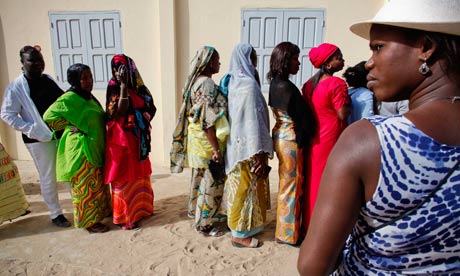Human Rights of Women
Source: The Guardian
Campaign aims to revoke nationality laws that may leave women without healthcare or education, or cause stress in families
A global campaign to revoke discriminatory laws that prohibit women from changing their nationalities, or conferring their nationalities on their children, was launched in Geneva this week.
The International Campaign to End Gender Discrimination in Nationality Laws, organised by a coalition of NGOs, UN agencies and academics, is calling on governments to amend any laws that deny women equal rights to men in regard to nationality and citizenship.
In contravention of the Convention of the Elimination of All Forms of Discrimination against Women, adopted by the UN general assembly in 1979, 27 countries do not allow women to confer their nationality on their children, and more than 60 countries do not afford women the same right as men to acquire, change or retain their nationality, or confer their nationality on their husbands if they were born elsewhere.
Twelve of the 27 countries, are found in the Middle East and north Africa, while eight are in sub-Saharan Africa, four in Asia and three in the Americas.

Senegalese women in Dakar wait to cast their votes during the 2012 election.
Last year, the country voted to amend its laws to allow women to transfer their nationality. Photograph: Nic Bothma/EPA
Jacqui Hunt, London director of advocacy organisation Equality Now, which is a member of the campaign's steering committee, said discriminatory laws prevent women and children from accessing state services, such as schooling and healthcare, and from getting work. It can also limit people's freedom of movement and, in some cases, increase anxiety levels over fears that a husband and child with a different nationality could be deported.
A report first published by Equality Now last year, and updated last month, said: "Where dual nationality is forbidden, women can be disproportionately affected. Women who live in their husband's country could be disadvantaged in terms of legal and social rights if they do not take on the nationality of their husbands, as well as having to face additional bureaucratic challenges.
"Losing her nationality of origin can leave a woman especially vulnerable if her marriage ends, particularly if her children have their father's nationality. Even if a woman is able to claim back her nationality on divorce or widowhood, delays and other hurdles in regaining citizenship can cause her considerable problems, including anxiety and hardship," it added.
But Hunt said there are positive signs of change. At the launch in Geneva on Wednesday, speakers from Senegal, Algeria and Kenya discussed the changes taking place in their countries. Last year, Senegal voted to amend its nationality law to give women the same rights as men to transfer their nationality to their husband and children. Meanwhile, Kenya's amended constitution promotes gender equality, although women's rights activists highlight large gaps between policy and implementation, particularly around laws on sexual violence,
"We're hoping this campaign will build on the momentum in recent years. We're hearing that governments are signing up which is a very positive move," said Hunt.
"For women and their families, if they don't have nationality they can't access state healthcare or education, they can't get government jobs ... they are all really vulnerable," she said. "The suffering of women and children is really terrible and unnecessary."
Campaigners are conducting research to show governments the benefits of revoking discriminatory laws. "If everyone participates, you're making society better and a more prosperous place," said Hunt.
The campaign is part of a wider push to get governments to repeal all laws that are discriminatory. At the UN fourth world conference on women in Beijing in 1995, 189 governments pledged to revoke all laws that discriminate on the basis of sex. A review of the Beijing platform for action in 2000 set a 2005 target for all laws to be repealed.
However, as well as laws that discriminate on the basis of nationality, legislation that offers little protection for women from rape, forced marriage and land grabs, or denies them inheritance, persists in many countries.
The government of Mozambique came under fire recently for its new penal code that, among the caveats, effectively allowed men to escape prosecution for rape if they married the victim. Despite NGOs securing some changes to the code, it still contains a vague definition of rape and affords no protection for women from rape in marriage.
The Guardian Global development website is working with EqualityNow to crowdsource rape laws around the world to compile a global database.
An in-depth assessment of progress towards the Beijing agreement will be made next year to mark its 20th anniversary.
